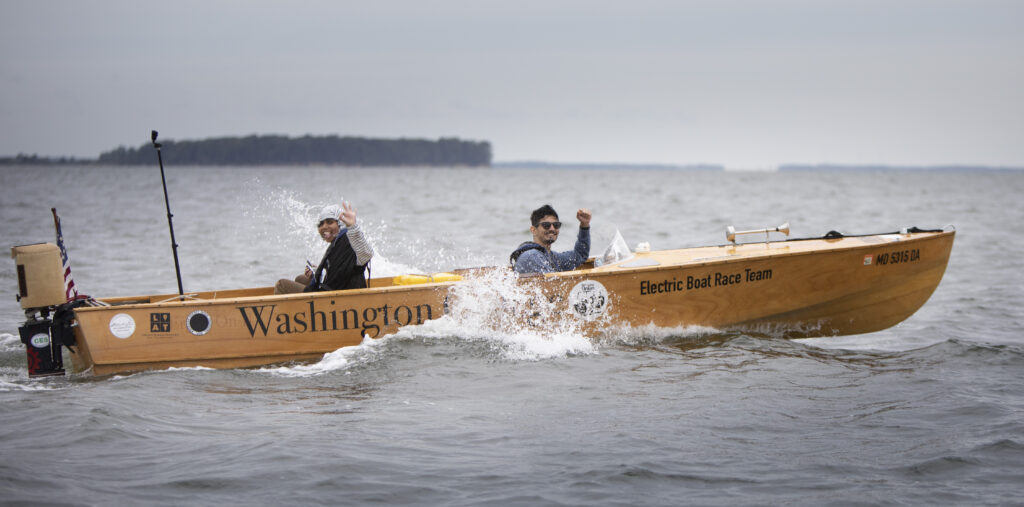Original Story Published in Chesapeake Bay Magazine:
Electric boat models (and motors) are gaining momentum at boat shows and on the water—now the industry is turning its attention to the next generation of engineers. A national competition held in Virginia Beach this spring pitted 42 student designs from 34 universities against each other, and a small college on Maryland’s Eastern Shore rose to the top of its class.
Chestertown’s Washington College may not have its own engineering school, but it does have its remarkable IDEAWORKS Innovation Center. Sited along the upper Chesapeake’s Chester River, this college of only about 1,000 undergraduates is an ideal setting for trying out electric propulsion ideas on boats.
The college has become a power player in race competitions at the collegiate level. Its vessels have outperformed rigs from many larger institutions with well-known engineering schools.
Examples include their home competition, the Earth Day eRegatta; the long-running Wye Island Challenge, and, most recently, the sixth annual Promoting Electric Propulsion for Small Craft (PEP) regatta, conducted at the end of April on Virginia Beach’s Broad Bay.
PEP is a collaboration between the American Society of Naval Engineers, the U.S. Navy’s Sea Warfare and Weapons Department, and the Naval Sea Warfare Center Carderock. It’s designed specifically to attract and showcase young engineers and entrepreneurs to work with these agencies and their industry partners. Competing craft include multiple classes for both manned and unmanned craft, with both mono- and multihulls made of varying materials competing. The PEP Broad Bay course is a timed run out-and-back around a buoy, over a total of five miles (statute).

One of WC’s race-winning manned craft a traditional-looking wooden runabout that placed third in the planing monohull category. The other is a high-tech trimaran with three lithium-iron-phosphate battery banks ingeniously wired in series to drive its 144-volt motor, with significant safeguards for cooling and emergency failsafe mechanisms. The trimaran was victorious with a win in the displacement manned category. It also ran second in its class in 2023.
Washington College was the only institution to place in two different categories.
In addition to WC, winning institutions in this year’s competition included Princeton University, whose Big Bird set the current record for fastest electric speedboating last fall at 114.20 mph, and the University of Alabama. Other institutions from the Chesapeake watershed participating in PEP this year include the College of William & Mary (third in unmanned multihull in 2023), Old Dominion University (third in the manned monohull category in 2023, plus a spirit award for acting as the hometown team to assist other teams), Virginia Tech, the University of Virginia, Virginia Commonwealth University, George Mason University, Howard University, and Johns Hopkins University.
One element in the success of these schools’ programs is the blending of multiple disciplines in each venture. For example, the WC venture at IDEAWORKS includes a Design Team, a Testing Team, an AI Team, an R&D Team, and, significantly, a Business Team. As WC’s IDEAWORKS website explains, “There was a time when you could follow a simple formula to success: Work hard in college and climb the corporate ladder.”
But no longer—The program website likens today’s complex global economy to a maze. “To navigate this elaborate maze, today’s student will need to employ creative and critical thinking, learn from mistakes and solve complex problems through iterative design. They need to know how to communicate effectively. They need to know how to pivot, how to adapt, how to revise, how to persevere. They need to think divergently.”
Princeton’s team is built around the same kind of synergy. The engineers behind Flux Marine’s innovative electric outboards participated in the program as undergraduates there. There is strong motivation across all of PEP’s growing roster of competing institutions to approach the challenge of carbon-neutral boating broadly, exploring ideas that can lead to comprehensive, real-world governmental and business solutions that range from pleasure boating on the Chesapeake to global shipping and naval operations.
